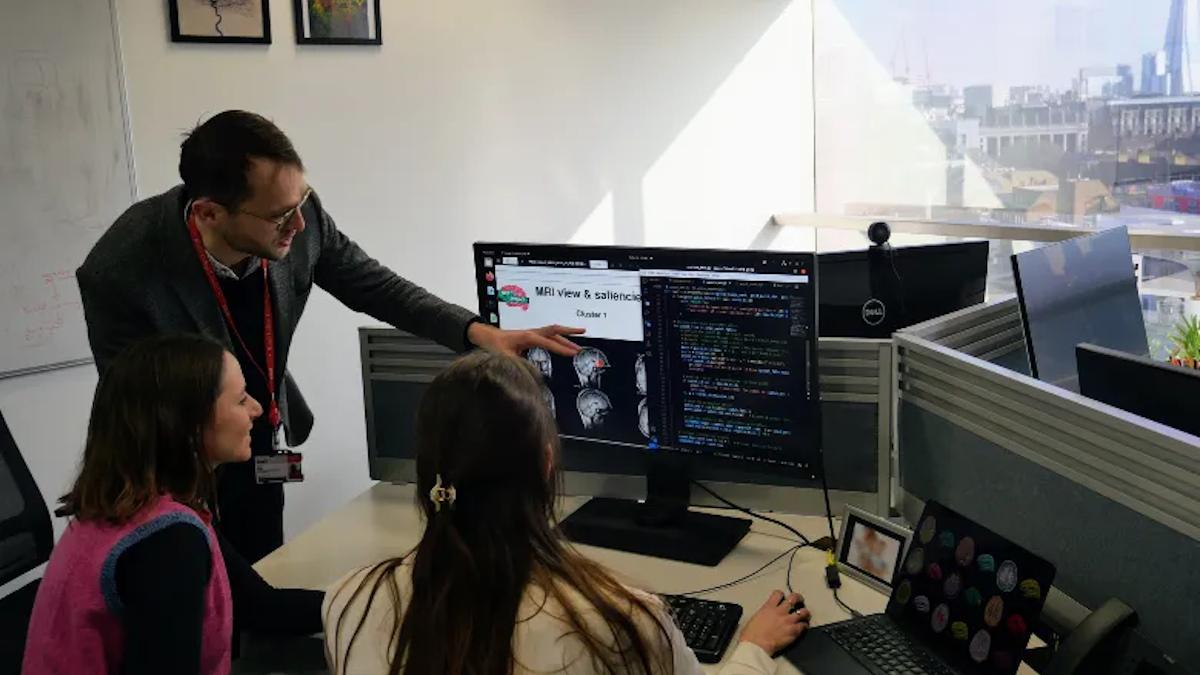AI tool detects brain lesions linked to epilepsy

Project leads Dr Konrad Wagstyl, Dr Sophie Adler and Dr Mathilde Ripart, working on the MELD AI algorithm at King's College London.
Researchers have developed an artificial intelligence-powered tool that was able to detect two-thirds of brain abnormalities linked to epilepsy that were missed by radiologists.
The MELD Graph tool – developed by a team led by scientists at King's College London (KCL) – could "drastically change" care for around 30,000 people with a particular type of epilepsy in the UK by speeding up diagnoses and access to surgical treatment, and reducing costs to the NHS by "up to £55,000 per patient."
It has been designed to spot epilepsy associated with focal cortical dysplasia (FCD) in the brain, a brain lesion seen in around 20% of all epilepsy patients, but which can be subtle and difficult to spot even by trained radiologists from regular MRI scans. There are around 4 million people worldwide with FCD epilepsy.
Surgery is the best treatment, as FCD epilepsy does not tend to respond to medications. Improved diagnosis could lead to reduced exposure to ineffective drugs, earlier surgeries, fewer emergency visits to hospital, and less disruption to school, work, and home life.
MELD Graph has been put through its paces in a study involving 703 patients, published in JAMA Neurology, which showed that it was able to detect 64% of FCD lesions previously missed by radiologists. The tool was trained on MRI scans from a total population of more than 1,185 adults and children at 23 hospitals around the world.
"Radiologists are currently inundated with images they have to review," said project lead author Dr Konrad Wagstyl from KCL's School of Biomedical Engineering & Imaging Sciences.
"Using an AI-powered tool like MELD Graph can support them with their decisions, making the NHS more efficient, speeding time to treatment for patients and relieving them of unnecessary and costly tests and procedures."
For example, the researchers describe one case involving a 12-year-old boy who had daily seizures and had tried nine different anti-seizure medications to control them, with no improvement to his condition.
While the tool is not yet clinically available, the research team have released the neural network tool as open-source software, and are running workshops to train clinicians and researchers around the world – including Great Ormond Street Hospital in the UK and the Cleveland Clinic in the US – in how to use it.
Drug shortage problem
The potential of the tool to assist in identifying patients not suitable for anticonvulsant medications comes as patient organisations in the UK have written to Health and Social Care Secretary West Streeting calling for action on critical shortages of epilepsy drugs that they claim are putting patients at risk.
An open letter – which has been signed by 45 MPs – cites delays that have forced some patients to go without medicines or switch to "inadequate alternatives." Last month, news emerged of the case of 44-year-old David Crompton from Yorkshire, who died after being given an IOU for his epilepsy medication from his pharmacy.
A survey by the Epilepsy Society, Epilepsy Action, SUDEP Action, and Parkinson's UK of almost 1,500 people with epilepsy or Parkinson's showed that 70% of respondents had experienced difficulties in getting vital medication, with 55% having to visit multiple pharmacies before getting their prescription filled and 66% only being given a fraction of their medication due to limited supplies.












